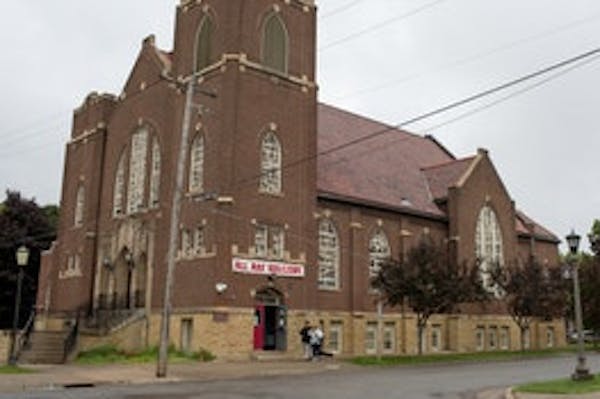First Lutheran Church has sued the city of St. Paul in federal court, saying the city is infringing on its religious right to minister to the poor and homeless by placing strict conditions on Listening House, a drop-in day center that occupies the church's basement.
The lawsuit filed Friday in U.S. District Court follows one Listening House filed last week in Ramsey County District Court.
At issue in both cases are the zoning regulations and conditions the St. Paul Planning Commission and City Council placed on Listening House, including hours and number of people served.
In an e-mail response Sunday afternoon, St. Paul City Attorney Lyndsey Olson said her office has not yet received the lawsuit.
But, she said the city recognizes the importance of the services Listening House provides.
"We are committed to finding a way forward that will serve both the Swede Hollow neighborhood and Listening House," Olson said.
Listening House moved to the basement of First Lutheran Church in the Dayton's Bluff neighborhood, just above Swede Hollow Park, in 2017 after redevelopment forced it out of downtown St. Paul. First Lutheran, founded in 1854, has ministered to the poor since its inception. The church sought and obtained approval for Listening House through a "determination of similar use" from the city in March 2017.
But soon after, neighbors complained about "loud, sometimes disrespectful, often intoxicated, sometimes actively psychotic, sometimes criminally engaged, sometimes threatening, sometimes argumentative people" coming and going from Swede Hollow Park and Listening House, the lawsuit said.
The neighbors appealed the city's approval and in October, the St. Paul Planning Commission added additional and stricter conditions to the "determination of similar use." Listening House appealed those conditions, with support from First Lutheran.
In December, the City Council denied both appeals and adopted the conditions. The condition of a 20-person limit was delayed until April 2.
"Last week, Listening House filed a case in state court; their case involved state law challenges involving mostly zoning and land use-related claims," said Evan Berquist, the attorney for First Lutheran. "First Lutheran's case is technically separate and distinct from the Listening House case. As a church, First Lutheran has its own independent legal rights including the right to free exercise, which is protected under federal and state law."
In the lawsuit, First Lutheran said the city is violating its right to free speech, religion and assembly as well as a federal act that prevents the government from using land-use laws to restrict groups that want to practice their "religious mission." It also said the city is violating the Minnesota Constitution's "Right of Conscience" article, which gives people the right to worship freely.
The church said in its lawsuit that the conditions imposed on First Lutheran and Listening House "effectively render their partnership impossible" and require the church "to speak and act in ways that are inconsistent with its religious beliefs and charitable mission."
If Listening House has to find a new home elsewhere, the church will lose its access to the center's social work and mental health professionals, as well as many part-time workers and volunteers who help with the church's own social services.
In a news release, the church and its attorney said they regret having to resolve the matter in the courts but felt they had no other option. "Preventing churches like First Lutheran and organizations like Listening House from offering these badly needed services will not reduce the amount of people who are walking out on the streets," the release said.
Pat Pheifer • 612-673-7252

'Safe recovery sites' would offer syringes, naloxone and more to people using drugs. The plan could be in peril.
New Minnesota GOP leaders seek peace with party's anti-establishment wing

Who is Republican Lisa Demuth, Minnesota's first House speaker of color?

